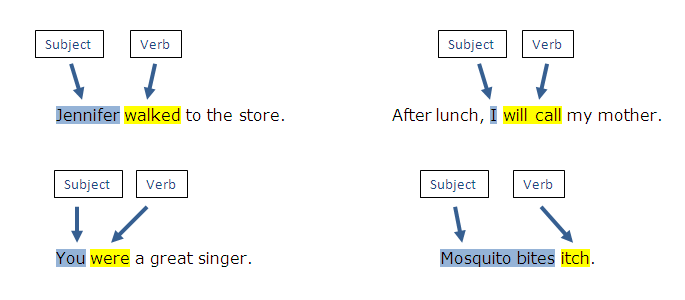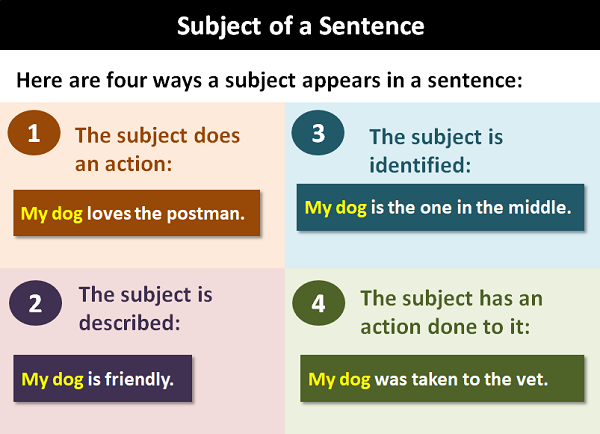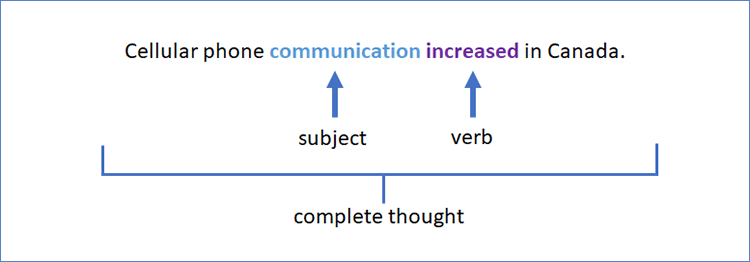
A subject is a person, place, thing, or idea that is being talked about in a sentence. It is the main part of a sentence and it usually comes before the verb.
Here are some examples of subjects:
- The cat sat on the mat.
- The house is big and red.
- I like to eat ice cream.
- The students are learning about grammar.
- The teacher is writing on the whiteboard.
Subjects can be simple or complex. A simple subject is a single noun or pronoun. A complex subject is a group of nouns or pronouns that are joined together by words such as "and," "or," or "nor."
Here are some examples of simple and complex subjects:
- Simple subjects:
- The dog
- The ball
- The boy and the girl
- I
- You
- Complex subjects:
- The dog and the cat
- The boy who lives next door
- The students who are in my class
- The books that I read
- The places that we have visited
Subjects can also be compound or compound-complex. A compound subject is two or more subjects that are joined together by a conjunction. A compound-complex subject is two or more subjects that are joined together by a conjunction, and one or more of the subjects is modified by a dependent clause.
Here are some examples of compound and compound-complex subjects:
- Compound subjects:
- The dog and the cat are playing.
- The boy and the girl are going to the park.
- I and you are going to the movies.
- Compound-complex subjects:
- The dog, which is my favorite pet, is playing fetch.
- The boy, who is my best friend, is going to the park with me.
- I, who am the oldest child in the family, am going to the movies with my sister.
Subjects are important in grammar because they help to determine the verb agreement in a sentence. The verb in a sentence must agree with the subject in number and person.
Here are some examples of verb agreement with subjects:
- The dog runs in the park.
- The dogs run in the park.
- I run in the park.
- We run in the park.
In the first sentence, the subject is "dog" and the verb is "runs." The verb agrees with the subject in number and person because the subject is singular and third person. In the second sentence, the subject is "dogs" and the verb is "run." The verb agrees with the subject in number and person because the subject is plural and third person. In the third sentence, the subject is "I" and the verb is "run." The verb agrees with the subject in number and person because the subject is singular and first person. In the fourth sentence, the subject is "we" and the verb is "run." The verb agrees with the subject in number and person because the subject is plural and first person.
Subjects are also important in writing because they help to focus the reader's attention on the main topic of the sentence. When the subject is clear and concise, the reader is able to understand the sentence more easily.
Here are some tips for writing clear and concise subjects:
- Avoid using prepositional phrases at the beginning of sentences.
- Use strong verbs that require subjects.
- Use active voice instead of passive voice.
- Combine short sentences into longer sentences to avoid repetition of subjects.
By following these tips, you can write clear and concise subjects that will help your readers to understand your writing more easily.
Websubject n /ˈsʌbdʒɪkt/. the predominant theme or topic, as of a book, discussion, etc. any branch of learning considered as a course of study. a word, phrase, or formal expression. WebA subject is one of the five major elements of clause structure. The other four are: verb, object, complement and adjunct. Subjects are essential in declarative, negative and. Websubject (plural subjects) In a clause: the word or word group (usually a noun phrase) about whom the statement is made. In active clauses with verbs denoting an. WebSubject can mean "topic," as in "Let's change the subject." It can also mean "to make someone do something," as in "Don't let your dad subject you to an hour-long lecture on. Websubject meaning: 1. what someone is writing or talking about: 2. an area of knowledge studied in school or…. Learn more. Websub·jec′tion (səb-jĕk′shən) n. Synonyms: subject, matter, topic, theme. These nouns denote the principal idea or point of a speech, a piece of writing, or an artistic work. Subject is.
What is a Subject English Grammar for Beginners | Basic English | ESL

Source: Youtube.com
What Is a Subject in Grammar: Oregon State Guide to Grammar

Source: Youtube.com
What Is A Subject, What is a Subject English Grammar for Beginners | Basic English | ESL, 3.55 MB, 02:35, 214,894, Socratica, 2013-11-18T00:33:32.000000Z, 2, What is a subject? - Walden University, 300 x 685, jpg, , 3, what-is-a-subject
What Is A Subject. Weba person or thing that undergoes or may undergo some action: As a dissenter, he found himself the subject of the group's animosity. a person or thing under the control or.
Do you know how to find the subject of a sentence? The subject is a "doer." Find who or what is doing the action, and you've found your subject!
Watch Next - What is a Predicate
bit.ly/2n5sLeY
You have great ideas. But no one will know about them if you can't communicate effectively! Our series of Basic English Grammar Rules will help you brush up your language skills. People will pay attention to you ideas - not your grammar mistakes. Feel more confident about the SAT and the ACT. Great for homeschooling, English as a Second Language (ESL) and studying for the TOEFL, too!
Click to watch more grammar lessons:
bit.ly/1LnJ1CN
Don't forget to Subscribe so you'll hear about our newest videos!
bit.ly/1ixuu9W
♦♦♦♦♦♦♦♦♦♦
We Recommend:
Strunk and White (short and a classic)
amzn.to/2nR1UqC
Eats, Shoots & Leaves (funny! On punctuation)
amzn.to/2ni5Myf
Word Power Made Easy (vocab building)
amzn.to/2ohddVP
♦♦♦♦♦♦♦♦♦♦
Ways to support our channel:
► Join our Patreon : patreon.com/socratica
► Make a one-time PayPal donation: paypal.me/socratica
► We also accept Bitcoin @ 1EttYyGwJmpy9bLY2UcmEqMJuBfaZ1HdG9
♦♦♦♦♦♦♦♦♦♦
Grammar Girl: Liliana de Castro
Written by Charity Hume
Directed by Michael Harrison
Produced by Kimberly Hatch Harrison
♦♦♦♦♦♦♦♦♦♦
Connect with us!
Facebook: facebook.com/SocraticaStudios/
Instagram: instagram.com/SocraticaStudios/
Twitter: twitter.com/Socratica
♦♦♦♦♦♦♦♦♦♦
What Is A Subject, WebSubject can mean "topic," as in "Let's change the subject." It can also mean "to make someone do something," as in "Don't let your dad subject you to an hour-long lecture on. Websubject meaning: 1. what someone is writing or talking about: 2. an area of knowledge studied in school or…. Learn more. Websub·jec′tion (səb-jĕk′shən) n. Synonyms: subject, matter, topic, theme. These nouns denote the principal idea or point of a speech, a piece of writing, or an artistic work. Subject is.

What is a subject? - Walden University - Source: academicanswers.waldenu.edu

Subject of a Sentence: Definition and Examples - Source: grammar-monster.com

Sentence Structure: Subjects and Verbs – CS 050: Academic Writing and Grammar - Source: ecampusontario.pressbooks.pub
What is a subject in english
What is a subject in english branch of knowledgebranch of studycourse of studyspeciality What is a subject matter.
What is a subject matter
What is a subject matter What is a subject verb agreement.
What is a subject verb agreement
What is a subject verb agreement What is a subject in a sentence.
.
What is a subject in a sentence
What is a subject in a sentence What is a subject.
.
What is a subject
What is a subject What is a subject in a sentence.
What is a subject access request www.dictionary.com › browse › subjectSUBJECT Definition & Meaning | Dictionary.com
What is a subject access request a motive, cause, or ground: a subject for complaint. Synonyms: rationale, reason. the theme of a sermon, book, story, etc. the principal melodic motif or phrase in a musical composition, especially in a fugue. an object, scene, incident, etc., chosen by an artist for representation, or as represented in art. What is a subject verb.
dictionary.cambridge.org › english › subjectSUBJECT | definition in the Cambridge English Dictionary
Learn the meaning of subject as a noun, adjective, and verb in English. Find out how to use subject in different contexts, such as grammar, politics, and art. What is a subject access request.
.
.
.
dictionary.cambridge.org › learner-english › subjectSUBJECT | definition in the Cambridge Learner's Dictionary
Learn the meaning of subject as a noun or an adjective in English. Find out how to use subject in different contexts, such as writing, grammar, study, and person. .
www.oxfordlearnersdictionaries.com › definitionsubject noun - Definition, pictures, pronunciation and usage ...
Learn the meaning, pronunciation and usage of the word subject as a noun in English. Find out the different meanings and examples of subject in conversation, education, art, science, grammar and country. .
.
What is a subject verb writingexplained.org › grammar-dictionary › subjectWhat is a Subject? Definition, Examples of Subjects in English
What is a subject verb What is a subject complement.
What is a subject complement dictionary.cambridge.org › dictionary › englishSUBJECT | English meaning - Cambridge Dictionary
What is a subject complement Learn the meaning of subject as a noun, adjective, and verb in English. Find out how to use subject in different contexts, such as grammar, politics, and art. What is a subject pronoun.
What is a subject pronoun www.merriam-webster.com › dictionary › subjectSubject Definition & Meaning - Merriam-Webster
What is a subject pronoun Learn the various meanings and uses of the word subject as a noun, adjective, and verb. Find synonyms, examples, etymology, and related phrases of subject. What is a subject matter expert.
What is a subject matter expert
What is a subject matter expert What is a subject in english.
Post a Comment